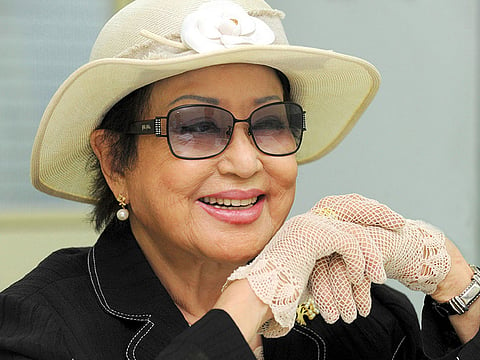South Korean actress once kidnapped by North dies at 91
She was forcibly sedated with a needle and then kept drugged and without food for eight days before arriving in the North

Seoul: A South Korean actress who was once kidnapped by the North’s agents on the orders of late leader Kim Jong-il in a Cold War-style intrigue and forced to make films for the regime has died aged 91, her family says.
Choi Eun-hee was the South’s most famous actress for decades before being brazenly abducted by North Korean spies in Hong Kong in 1978 at the request of the North’s then leader-in-waiting Kim Jong-il, an avid film fan.
During her visit to Hong Kong to meet a potential investor in her arts school, she was reportedly lured onto a boat by her guide before being transferred against her will to a cargo ship destined for North Korea.
She was forcibly sedated with a needle and then kept drugged and without food for eight days before arriving in the North.
Her husband Shin Sang-ok, a top film director, was taken to the North soon after, although circumstances over his abduction remain unclear.
Kim Jong-il, who ruled the isolated country from 1994 until his death in 2011, was bent on using his captives to make films that could compete on the international stage.
Choi remained trapped in the North for eight years, where she and Shin made more than 10 films together under Kim’s watch.
Choi would later describe a complex relationship with a captor who “respected us as artists and fully supported us”, but whom she could never forgive for the “outrageous and unforgivable” kidnapping, according to a 2011 interview.
They were allowed to make “films with artistic values, instead of just propaganda films extolling the regime,” Choi said, but always longed for their freedom.
Kim spared no expense when it came to making their movies. For one action sequence involving a train crash he provided a real locomotive loaded with dynamite, while for another film requiring windy conditions he ordered a helicopter to hover overhead.
In another interview, Choi described how Kim had attempted to lift her spirits at a dinner shortly after her arrival in the North.
“I was in utter despair back then, and he tried to cheer me up, saying, ‘Look at me Ms Choi. Don’t I look like a short fat dwarf?’” she told Dong-A Ilbo, a major newspaper in Seoul.
“I couldn’t help laughing at that moment.”
Kim had a personal film archive containing 15,000 movies from around the world, according to Shin’s memoir.
His collection included “300 South Korean movies with detailed descriptions on the production year, stars and names of all production staff”, Shin wrote.
During their ordeal, the couple travelled overseas extensively for film production and to attend film festivals — always under heavy surveillance by the North’s agents.
Choi even won the best actress award at the Moscow International Film Festival in 1985 for her role in Salt — a film about Korean guerrillas fighting the 1910-45 Japanese colonial rule.
The couple — who had divorced in 1976, before their abductions — remarried during a trip to Hungary at Kim’s urging.
But Choi later recounted how, during her time in the North, she cried every night at the thought that “none of this would have happened if I was not an actress.”
“Kim Jong-il offered me all kinds of generosity and royal treatment, but I could not erase the resentment towards him,” she wrote in her 2007 memoir.
They finally staged a daring escape to the US embassy in Vienna after attending the Berlinale film festival in 1986. Choi later recounted how a Japanese reporter smuggled them by taxi to outside the embassy gates, before they made a dash for safety.
“I still have nightmares of being chased after by North Korean agents,” she said in a 2015 interview. “When I arrived at the US embassy in Austria and was told ‘welcome to the West,’ I burst into tears. I couldn’t stop crying.”
The couple sought asylum in the US due to fears for their personal security, before returning to the South in 1999 after more than a decade in the US.
They remained married until Shin’s death in 2006. Their dramatic life inspired several books and movies.
Choi, who made her cinematic debut in 1942, rose to stardom in the wake of the 1950-53 Korean War that sealed the division between the communist North and the capitalist South.
She was called the “queen” of South Korean cinema from the 1950s to the 1970s while appearing in more than 100 movies — many made by Shin.
North Korea abducted hundreds of South Koreans under a state-sanctioned policy in the decades following the Korean War, including soldiers and intellectuals as well as poor fishermen.
More than 500 South Korean abductees remain in the North, along with a dozen from Japan, according to the Seoul-based Asan Institute of Policy Studies.
Choi’s funeral will be held in Seoul on Thursday.
Sign up for the Daily Briefing
Get the latest news and updates straight to your inbox



